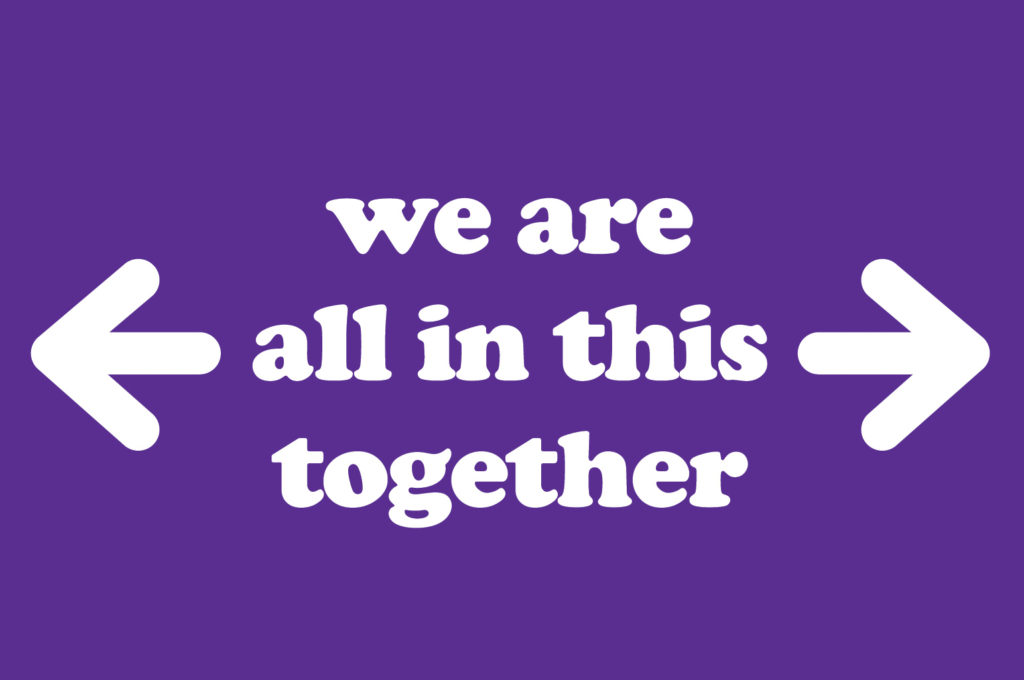It is surreal that we are living through a plague. We’ve all heard about the plagues that killed over half the European population in the middle ages. What seemed like simply a historic event or a reference in a Shakespearean play is now our own reality. Regardless of how modern we feel, we are now connected to the Bubonic plagues (“Ring around the Posie” anyone?), Smallpox and Yellow Fever outbreaks, polio epidemic, and Spanish flu. This is surreal!
There’s so much to think about! During this pause, I know I join many of you in reevaluating many notions we’ve held dear.
This is what I’m thinking about:
This is the first globally collective experience
Even World War II did not affect every place on Earth. Yet Covid-19 has spared no place where there are people. It is an equal opportunity virus in terms of who it infects, although we are learning that the impacts and death rates are being disproportionately borne by the elderly, people of color and low income folks.
Our heroes right now are those who rarely get attention – health care workers, scientists, grocery and delivery workers, truck drivers, utility workers journalists, teachers etc., not actors, singers or athletes who we usually pay most attention to. Many of these frontline workers earn at or near the minimum wage. Could this collective experience lead to a more empathetic distribution of wealth by putting into place policies and programs that support rather than disproportionately harm the working class, per usual?
We need to be mindful about the rush to return to normal
Our “normal” is to stay so busy and focused on the short-term that we tend to put off needed reforms. In an economic context, this often means assuming best case scenarios and a cost minimization mindset, with little regard to making needed changes or preparing for “what ifs.”
As we approach the new normal, it’s critical that we embrace the lessons learned – the good and the bad.
Such as …. reevaluating profit making and financial constructs so that resilience, preparation and mitigation can be monetized, and thereby prioritized.
We’ve learned this lesson over and over, and for the most part, forget it once the crisis is behind us. Covid-19 is a case in point. Not putting in place adequate stocks of PPE or testing, expecting those without insurance to be able to access testing and treatment, making it impossible for rural hospitals to stay in business, not anticipating the need for rapid changes in food supply – these were conscious decisions made at senior levels even after MERS and SARS outbreaks.
What else we need to be realistic about: the climate crisis
Warnings about the inevitability of a pandemic are not the only ones we’ve disregarded. Our climate is screaming at us.
In the last decade, we’ve contended with Superstorm Sandy (East Coast); Hurricanes Harvey (Houston), Irma (Florida), Maria (Puerto Rico) and Dorian (Bahamas); California wild fires; severe tornadoes; earthquakes; extreme drought, insect infestations and other events that have touched every part of our country and much of our economy. Each year of inaction leads to higher temperatures, even if by seemingly small amounts. Even slight changes in temperatures send strong signals to our atmosphere and the natural world of trees, insects, soil, animals, etc.
We can expect more severe weather and devastating events. Beyond the impacts on our homes, businesses and infrastructure, we should expect to contend with diseases never seen in the United States, like malaria, as temperatures rise. As ice melts in the polar regions, there are heretofore unknown organisms and viruses that will be released and could harm humans, similar to Covid-19. This is not a political issue. It’s just reality.
In my years working on climate change and clean energy at the US Department of Energy, there was significant resistance to investing in preparing for natural disasters. Recent improvements in cost and performance have made systems like solar plus (battery) storage much more affordable, although the cost of the storage component can be hard to justify without a way to put a monetary value on the insurance it provides. Yet, those communities who had the foresight to invest in these systems in Puerto Rico or New York saw immeasurable returns on investment in the first hours of their crises, as emergency operations centers had the energy power to provide important information, supplies and food to desperate residents. Emergency preparedness needs to be added to the cost minimization ethos, given the likelihood that these events will continue to increase.
In addition to preparing for the impacts of climate change, mitigating the risk of climate change can be a win-win as it calls for innovation and new thinking, and many jobs.
Some good news: just last week we learned that renewables recently overtook coal in US electricity production. The ability of solar and wind energy to be the least cost alternative in many parts of the United States is due in large part to substantial government and corporate research and development funding (especially significant in the American Recovery and Reinvention Act of 2009), not to mention States that prioritized renewable energy in their Renewable Portfolio (electricity) standards in the last 15 years. Actually, the solar plus storage systems referred to above are being used in ways unthinkable just a few years ago – to replace fossil fuels in peak times during the day to reduce costs, such as in the afternoon/early evenings. It’s to our advantage to harness the significant recent progress made in renewables, energy efficiency, transportation and resource efficiency. Not only will we reduce our human imprint on the only atmosphere we have, we will save money and provide the certainty businesses want.
How we react to the chaos of this pandemic is closely connected to how well our economy and environment fare as we emerge from it. Please read the Medium.com article below that warns us of rushing back to real life too fast and not fixing the issues that have long ailed our institutions and norms.
The Good and ?
It will be fascinating to see what unanticipated changes will come to our lives as we emerge from the big pause.
The favorite part of my childhood, and that of my kids, is due to the polio crisis in the 1930’s and 40’s. The Jewish sleepaway camp movement, so important for maintaining Jewish identity, started as a way to get kids out of New York and other northeastern cities during the polio epidemics. Both of my parents were sent to these camps at very young ages. This unique experience of spending multiple weeks with other kids (and few adults!) in a wilderness camp has been passed on to subsequent generations and is now available in many forms. We have polio to thank for this important and magical type of summer experience. Who knew?
I’m wondering if all the new families seen walking in my neighborhood will still do family walks? Will those who never really cooked before get hooked, and keep cooking? Will we continue to telework all or most of the time? Will there be a permanent change in how certain business is conducted, such as Courts and Congress?
A friend reminded me about how much dating has changed in this pandemic, with socially distant courting, reminiscent of much earlier times.
I am curious about density trends. In recent years, there’s been a rush to living in large cities, leading to hyper expensive housing costs, gentrification and the demise of historical communities. Will these large cities become less desirable, leading to more reasonable costs of living? Will smaller cities become even more desirable since New York, San Francisco and other large cities have been too expensive to live in and operate a business? Or will these smaller cities become so popular that they will price out those that have lived there for decades? Will suburban homes become attractive again since they are NOT adjacent to public transportation, a trend that two months ago was exactly the opposite? Will biking become even more popular as a means to commute to jobs and do errands?
I myself am reevaluating where I want to live in my retirement. I had been thinking living in a more densely populated area was what I wanted, mostly for the ability to walk to shops, restaurants and entertainment. However, I am more appreciative than ever for my suburban house that has ample space, easy access to the outdoors and nature, and great walks in any direction.
Will manufacturing return to levels not seen in decades in the United States, as we rethink the value of local and diversified supply chains? Will companies adjust these supply chains to be more nimble and able to adjust quickly to changes in market dynamics, so that food or toilet paper companies could suddenly service new customers? What will happen to gig economy jobs like Uber and Lyft? Will we continue to sustainably use food and household products as we are in this pandemic?
As an armchair historian, I’ve benefited from the intellectual discovery that the pandemic has afforded me. I’ve taken full advantage of access to many webinars and zoom learning opportunities that I likely would not have taken the time to go to. Rather than having to leave my house for interesting but often impersonal experiences, I’ve found it’s so efficient to just log in.
It’s fascinating to think that this pandemic will permanently change life as we know it, in some cases for the better, but we just don’t know how yet.
As I think about what I miss most – sitting in a café, going to a restaurant or play, traveling, going to baseball games, hanging out with my friends – I will pay more attention to how our tastes and preferences are changing, and what new opportunities could come from these changes in trends, customs and lifestyle.
Most of all, I hope we approach this next phase in a way that smartly connects dots. Being thoughtful about how we as individuals and society design our new normal will serve us all.
I would love to hear your thoughts about the pandemic. What are your hopes for the new normal and what benefits you’ve seen?
For more on this, please see my recent LinkedIn article that is related to this, but a little more scholarly in tone.
Other helpful and fun resources:
This is the article I refer to above from medium.com. We need to be careful that we don’t squander the opportunity during the Big Pause to get back to normal and not fix the problems in our society – national and global.
Good article from Forbes about considering career changes due to the pandemic. Also great advice about using social media to build career bona fides.
Listen to this podcast from KERA in Dallas: Will COVID-19 Spell the End of International Cooperation
An amazing video of how animals are reclaiming their habitats.




